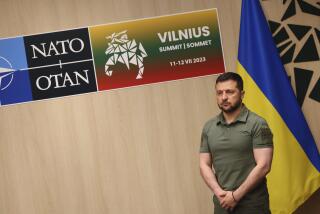PERSPECTIVES ON BOSNIA : HEAD. . . Clearly Upset at NATO’S Role : Russia is understandably concerned about its traditional sphere of influence falling under Western dominance.
- Share via
Russia’s reaction to the threatened air strikes in Bosnia clearly shows the dangers inherent in NATO’s intrusion in regions within Russia’s historical area of interest.
Some observers have argued that President Boris N. Yeltsin opposed NATO’s move to avoid being accused by Russia’s nationalists of caving in to the United States. This argument assumes that only “extremist” Russians were troubled by the prospect of NATO military action. But across the Russian political spectrum, NATO’s threat was genuinely viewed as dangerous and hostile. From the Russian perspective, this is understandable.
NATO, after all, was formed as a defensive alliance to repel a military attack on its member states. But in Bosnia, NATO has radically extended its writ by threatening intervention in a state unconnected to the alliance. Furthermore, NATO ostensibly was formed as an alliance hostile to the Communist Soviet Union; with the collapse of the Soviet state, many Russians wonder why NATO is needed. Surely, they argue, Western Europe can provide for its own diminished security needs through the European Union and no longer needs an organization run by a superpower across the Atlantic.
Taking into account these considerations, along with recent U.S. policy initiatives to absorb into NATO the east-central European states, one need not be a Russian “extremist” to understand why Yeltsin, in opposing NATO air strikes, stated that he was troubled by signs that NATO wished “to pursue designs of dominance.”
For good reason, Russians worry that an American-led NATO with expanded geographical responsibilities would present Russia with an intimidating presence, giving it little choice but to go along with the alliance’s policy preferences--even if Russian leaders believed those to be contrary to Russia’s best interests.
By its words and deeds in Bosnia, Russia has put the United States on notice that Moscow will regard with great suspicion any unilateral attempts by NATO to impose its will in those regions of Europe where Russia has traditionally strong ties. But Washington myopically assumes that if the United States regards NATO’s actions as benign attempts to promote stability in Eastern Europe, Russia has an obligation to view matters the same way. Any deviation from that perspective is to U.S. policy-makers evidence of faulty thinking or worse, evil intent. While Americans need not believe Russians’ suspicions to be justified, they must recognize them as understandable.
More to Read
Sign up for Essential California
The most important California stories and recommendations in your inbox every morning.
You may occasionally receive promotional content from the Los Angeles Times.












